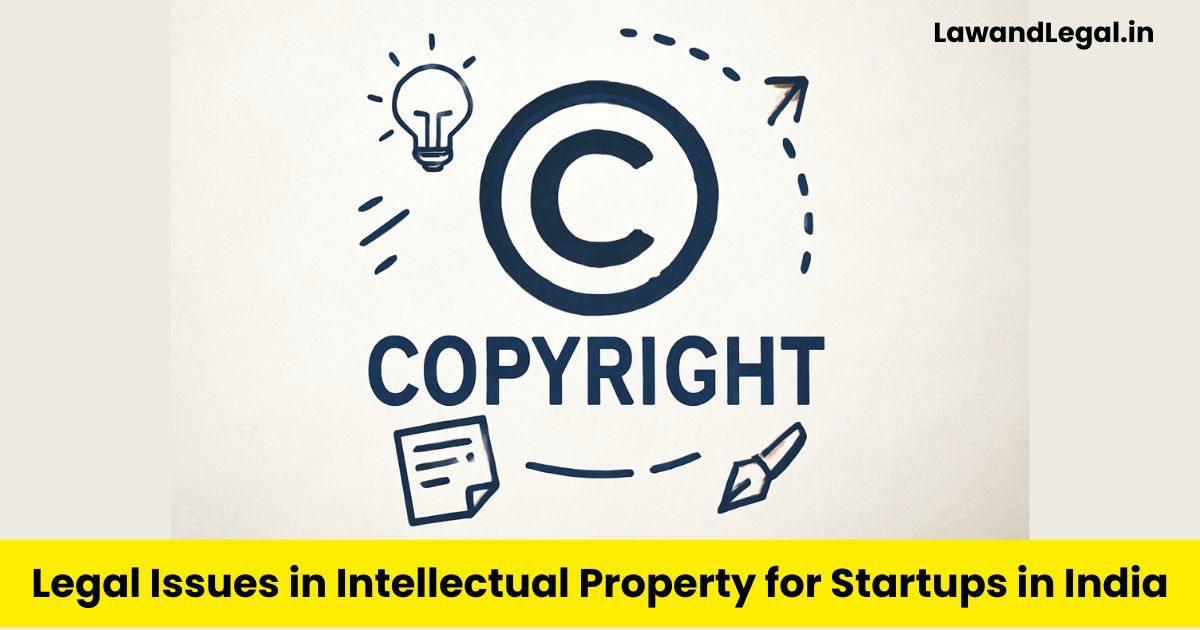Intellectual Property (IP) is a crucial asset for startups in India. As businesses grow, protecting innovations and creations becomes increasingly important. However, navigating the complex world of IP law can be challenging, especially for new and small businesses. Whether it’s protecting a logo, software code, or a unique business idea, startups must be aware of the various legal issues that could impact their IP rights. For more detailed insights, you can explore up-to-date information at Law and Legal. This article covers the key legal issues related to intellectual property for startups in India, providing insights into patents, trademarks, copyrights, and trade secrets.
Understanding Intellectual Property (IP) for Startups
Intellectual Property refers to creations of the mind such as inventions, literary and artistic works, designs, symbols, names, and images used in commerce. For startups, IP can play a key role in shaping their brand and protecting their innovations. As a business grows, IP becomes an essential asset to attract investors, enter new markets, and protect the company’s products or services from unauthorized use.
In India, intellectual property laws are governed by several acts, including the Patents Act, 1970, Trade Marks Act, 1999, and the Copyright Act, 1957, among others. Understanding these laws and how they apply to your startup is crucial for long-term success. For the latest news on intellectual property matters, visit www.lawandlegal.in .
Patents: Protecting Innovations and Inventions
Patents are a vital form of intellectual property protection for any startup that has developed a new product or process. A patent grants the inventor exclusive rights to make, use, sell, or distribute the invention for a limited period, typically 20 years from the date of filing.
Key Issues in Patent Protection for Startups
- Eligibility: Not every idea can be patented. To be eligible for a patent, an invention must be novel, involve an inventive step, and be industrially applicable.
- Filing Process: The patent filing process can be lengthy and costly. Startups should carefully consider the commercial potential of their invention before filing for a patent.
- International Protection: If your startup plans to operate globally, you may need to seek international protection through mechanisms such as the Patent Cooperation Treaty (PCT).
- Patent Infringement: Once granted, a patent holder has the right to prevent others from making, using, or selling their invention without permission. However, defending a patent in case of infringement can be costly.
Trademarks: Protecting Your Brand Identity
A trademark is any word, symbol, logo, or other identifiers that distinguish your goods or services from others. Registering a trademark helps protect your brand identity and prevents other businesses from using a similar mark that could confuse consumers.
Key Issues in Trademark Protection for Startups
- Trademark Search: Before filing for trademark registration, it’s essential to conduct a thorough search to ensure that the mark you want to use isn’t already registered by another entity.
- Global Protection: If your startup plans to expand internationally, you should consider registering your trademark in other jurisdictions, such as through the Madrid Protocol, which facilitates international trademark protection.
- Trademark Infringement: Trademark infringement can lead to significant financial losses and damage to your brand reputation. Startups should monitor the market to ensure that their trademarks are not being misused.
- Defensive Registration: For startups looking to safeguard their brands, registering multiple trademarks, including variations, can help prevent competitors from encroaching on your brand’s identity.
Copyright: Protecting Creative Works
Copyright law protects original works of authorship, such as software, literature, music, art, and other creative works. For startups involved in creating content, software, or other creative works, copyright protection is essential.
Key Issues in Copyright Protection for Startups
- Automatic Protection: In India, copyright protection arises automatically when a work is created, without the need for registration. However, registering a copyright provides legal evidence of ownership in case of disputes.
- Work for Hire: In many cases, employees or contractors who create works for a startup may transfer copyright ownership to the company as part of their employment contract. This is an essential consideration for startups to ensure that they own all the creative works produced by their team.
- Fair Use: The concept of “fair use” allows limited use of copyrighted material without permission in specific situations. However, startups should be cautious about using third-party content, as this could lead to legal challenges if not properly licensed.
- International Copyright: For startups with global ambitions, copyright protection extends beyond India. Many countries recognize Indian copyrights, but international registration may be required for certain works.
Trade Secrets: Keeping Your Business Knowledge Confidential
Trade secrets are business practices, formulas, processes, or any other confidential information that provides a competitive edge. Unlike patents or trademarks, trade secrets are not registered, but they are protected under contract law.
Key Issues in Trade Secret Protection for Startups
- Confidentiality Agreements: To protect trade secrets, startups should have employees, contractors, and business partners sign Non-Disclosure Agreements (NDAs), which legally bind them to confidentiality.
- Internal Security: Trade secrets require strong internal security measures to prevent unauthorized access, including restricting access to sensitive information, using encryption, and implementing digital security protocols.
- Misappropriation: If a trade secret is misappropriated (wrongfully obtained or disclosed), the startup can seek legal redress through civil and criminal actions. It is essential for startups to be proactive in enforcing their rights.
- Global Protection: Trade secret protection is generally available internationally, but each jurisdiction may have different laws regarding the extent of protection. Startups looking to protect trade secrets across borders should seek legal advice tailored to their specific situation.
Legal Insights and Key Takeaways
- IP Strategy: Startups should develop a clear IP strategy that outlines how they will protect their innovations. This includes decisions about which intellectual property to file for, how to monitor infringement, and how to enforce their rights.
- Legal Compliance: Ensuring that your startup complies with IP laws is critical. Regularly reviewing contracts, ensuring proper licensing, and maintaining proper documentation can help avoid legal challenges.
- Dispute Resolution: IP disputes can arise at any stage of business. It is essential to have a dispute resolution mechanism in place, such as alternative dispute resolution (ADR), to settle conflicts without resorting to costly and time-consuming litigation.
- Legal Counsel: Seeking expert legal advice is crucial when dealing with intellectual property issues. Having an experienced IP lawyer can help your startup navigate the complexities of IP law and protect your valuable assets.
Conclusion
Intellectual property is one of the most valuable assets for startups in India, and protecting it is essential for long-term success. Whether you are looking to protect your innovative products, unique logo, or creative works, understanding and navigating IP law is crucial. Startups should invest in building a solid IP strategy, ensuring legal compliance, and seeking expert legal counsel to safeguard their ideas and creations.














